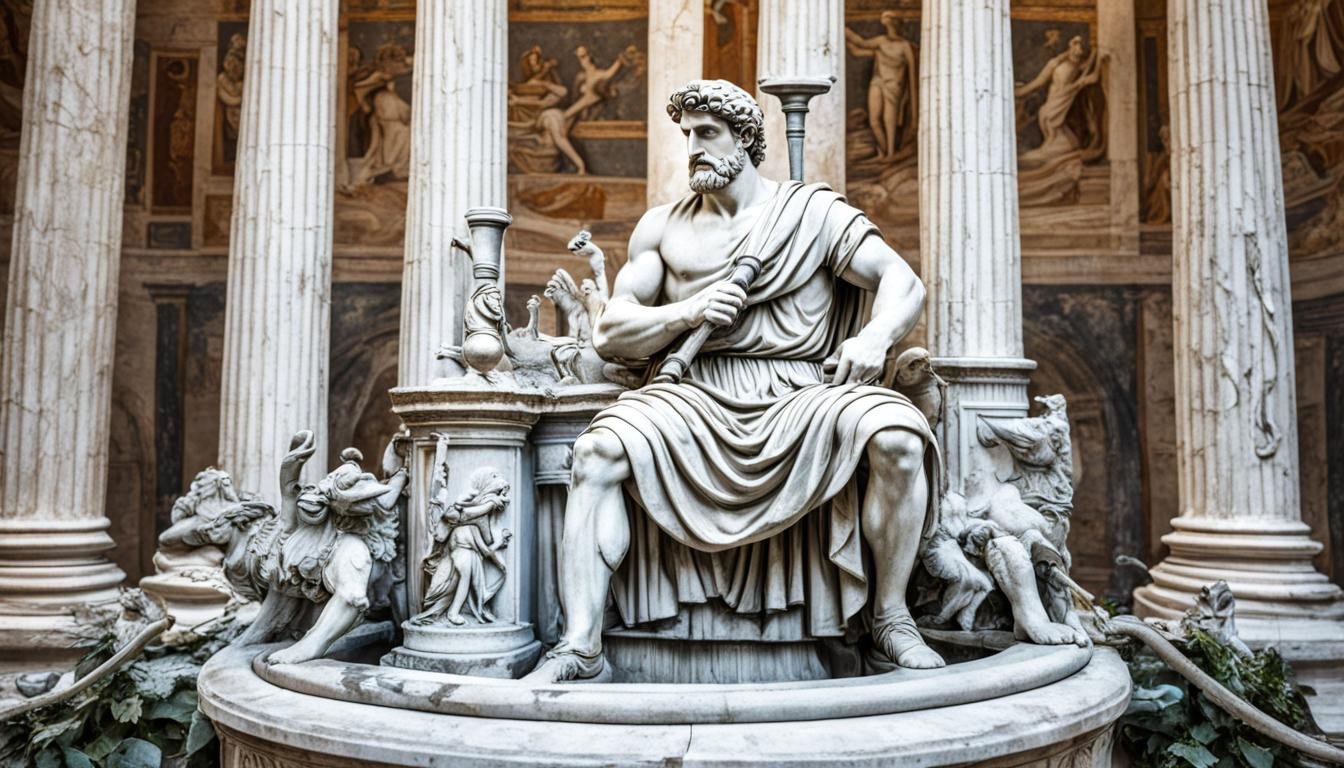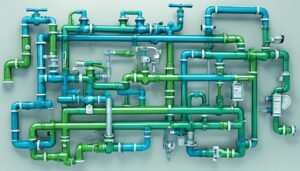
Plumbing is crucial in our lives now. But, it has a long history that began in ancient times. It started in places like the Indus Valley and ancient Rome. These places made early plumbing systems to handle water and waste.
During the Middle Ages, people in Islamic societies made new advances. These ideas later influenced how plumbing was done in Europe. Then, in the Renaissance, people got interested in better plumbing. This led to the creation of the flush toilet.
The Industrial Revolution changed plumbing a lot. Cast iron pipes and steam-powered pumps appeared. Later, in the 19th and 20th centuries, plumbing improved even more. Copper pipes, PVC, and electric water heaters became common. Sewage treatments also started to show up.
Key Takeaways
- Plumbing has a rich history dating back to ancient civilizations.
- Advancements in Islamic societies during the Middle Ages influenced European plumbing practices.
- The Renaissance period saw a revival of interest in plumbing technology, leading to innovations like the flush toilet.
- The Industrial Revolution brought significant changes to plumbing, including the introduction of cast iron pipes and modern toilet designs.
- Plumbing continued to evolve rapidly in the 19th and 20th centuries, with the use of new materials and the invention of modern plumbing technologies.
The Ancient Origins of Plumbing Professions
The idea of plumbing started in ancient Mesopotamia and Egypt. People back then had special roles in making sure there was water for everyone to drink, grow crops with, and keep cities clean.
Mesopotamian Water Carriers
In ancient Mesopotamia, water carriers were key in the community. They brought water from rivers or wells to the people. By using various methods, like jugs or buckets, they ensured cities had enough water. Their work was the beginning of the plumbing systems we see today.
Egyptian Water Engineers
In Egypt, near the Nile River, water engineers put together systems to keep cities clean. They made underground waterways and had special tools for installing and fixing pipes. Their efforts were the start of more complex plumbing work.

“The plumbing profession has a rich and storied history, with roots dating back thousands of years to the earliest civilizations.”
The jobs of these early plumbers influenced how we deal with water today. They started the path to where we are now, with our modern plumbing systems and the titles we give to plumbers.
Historical Plumber Titles Through the Ages
From ancient Rome to today, plumbers have gone through big changes. Each change reflected new needs and better technology. We’ll look at the Historical Plumber Titles, Plumbers in History, and Traditional Plumber Roles that shaped the job over time.
The Rise of the Plumbarius in Ancient Rome
In ancient Rome, the plumbarius, or lead-worker, was crucial. They designed and built the city’s aqueducts and sewers. They made sure water flowed well and waste was taken care of properly. It showed how vital plumbing was for cities.
Medieval Plumbers: A Neglected Craft
In the Middle Ages, plumbing was often forgotten, except in Islamic lands. There, they improved water systems and sanitation. The Plumbing Professions of the Past didn’t progress much elsewhere. People were not focusing on making plumbing better.
Renaissance Revival: The Rebirth of Plumbing Trades
The Renaissance brought plumbing back to the spotlight. They came up with new ideas, like the flush toilet. This Renaissance Revival made plumbers very important again. Skilled people worked to make life better for those in cities.
The story of plumbers is really interesting. It’s full of tales about Plumbers in History and how they changed the Historical Plumber Titles. Plumbers still play a huge role today. They help us build our dream homes.

Evolution of Plumbing Titles in the Modern Era
The history of plumbing has evolved a lot over time. It has seen big changes due to new technologies. In the Industrial Revolution, there was a lot of new stuff. Cast iron pipes, steam pumps, and newer toilets were made. This time changed the way plumbers worked and their titles.
Plumbing kept changing quickly in the 1800s and 1900s. Copper pipes and other new materials were used more. The electric water heater and sewage plants were invented, changing how we use and treat water. Now, plumbing is very specialized, with many different types of plumber jobs.
Today’s plumbers use many advanced tools and methods. They install and fix our plumbing systems. There are many types of plumbers, such as Pipefitters and Plumbing Contractors. They help make sure our homes, offices, and towns run smoothly. Their skills go beyond just fixing things. They also know about saving water and protecting our planet.
Plumbing has come a long way, showing the cleverness of people over time. From needing water in Mesopotamia to today’s Plumbing Technicians, the job has evolved. It meets the new and growing needs of our Dream Home Digest.
“The future of plumbing lies in its ability to adapt and innovate, shaping the way we interact with our environment and creating a more sustainable and efficient world.”
Conclusion
The journey through plumbing history has been eye-opening. It showed us how much the profession has changed. From the early days in Mesopotamia and Egypt to today, plumbers have become highly skilled experts.
Plumbing businesses have shown true resilience over time. Many of them have been in the same families for generations, showing the American dream at work. Now, with new materials like plastic pipes and advanced tools, plumbing is more efficient than ever.
Today’s plumbers are key whether you’re at home or running a business. They work hard and are very skilled. Looking ahead, the plumbing industry is crucial for our everyday life. It ensures our spaces have working plumbing we can trust.
FAQ
What are some historical titles for plumbers?
How did plumbing professions evolve over time?
What are some examples of traditional plumber roles and titles?
How have plumbing professions and job titles changed over time?
Source Links
- https://medium.com/@kaylahayden012/the-history-of-plumbing-from-ancient-times-to-modern-innovations-51230a385a91
- https://www.fieldpromax.com/blog/women-plumbers-reshaping-the-industry/
- https://theplumber.com/plumbing-in-america/
- https://www.plumberscompany.org.uk/our-company/about-us/history-and-traditions/
- https://24hourplumberparramatta.com.au/a-crash-course-in-plumbing-the-intriguing-history-behind-the-term-pipefitter/
- https://plumberslocal8.com/history/
- https://www.pmmag.com/articles/84096-living-legends-the-history-of-our-nation-8217-s-oldest-plumbing-companies
- https://www.actionjacksonplumbing.com/blog/plumbing-company/10-famous-plumbers-you-may-not-know-about
- https://boboates.com/the-5-most-famous-plumbers
- https://www.workingpressuremag.com/a-brief-history-of-plumbing-codes/
- https://en.wikipedia.org/wiki/Plumber
- https://local5plumbers.org/history.aspx
- https://emergencyplumberbaulkhamhills.net.au/unraveling-the-mystery-of-plumbers-exploring-the-history-of-their-name/
- https://stgeorgeemergencyplumber.com.au/how-plumbers-got-their-title-a-short-account-of-the-classic-occupation/
- https://penrithemergencyplumber.com.au/the-story-of-how-plumbers-got-their-title-a-brief-account-of-the-classic-trade/






No comment yet, add your voice below!